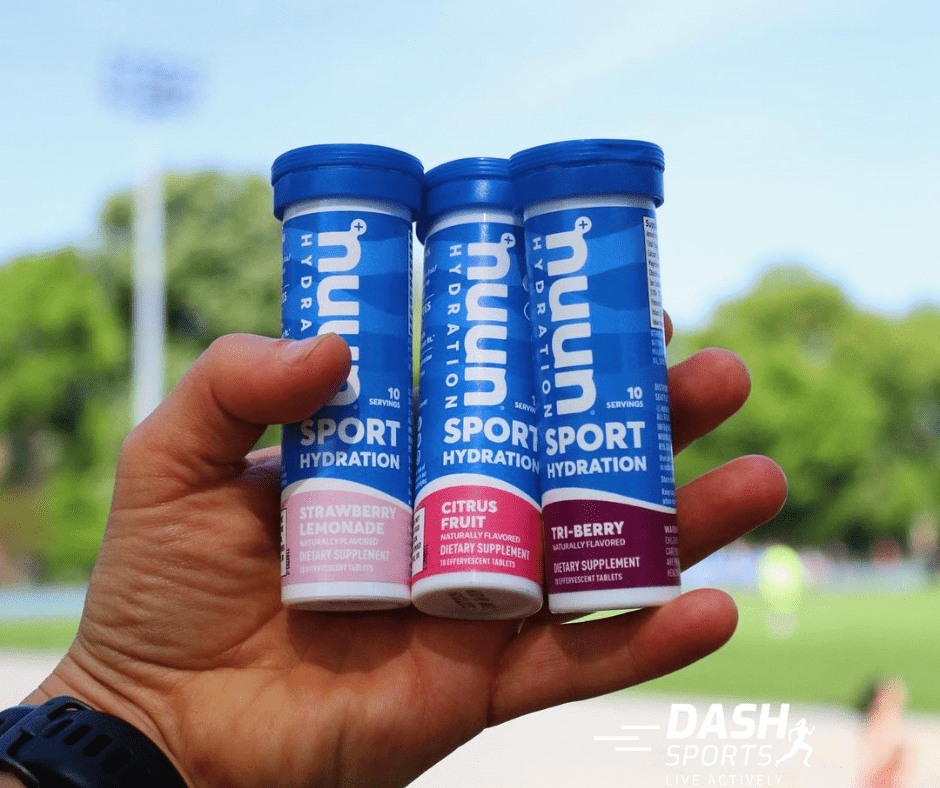When you’re pounding the pavement or tackling the trails, staying hydrated is as critical as lacing up your running shoes. Running, especially in hot or humid conditions, increases your body’s need for water, making hydration essential for peak performance and safety. Dehydration occurs when your body loses more fluids than it takes in, and it can sneak up on you quickly, subtly undermining your health and your running efforts.
Recognizing the signs and symptoms of dehydration can help you take action before it significantly impacts your run. Some common indicators include feeling dizzy, a rapid heartbeat, and fatigue. These symptoms might start out mild but can soon escalate to more serious complications if not addressed. As a runner, learning to monitor your hydration before, during, and after your runs is an essential skill that can improve your performance and prevent the negative effects of dehydration.
- Explore Our Store Today
Experience the unique Dash Sports approach with our tailored shoe fitting service.
Key Takeaways
- Proper hydration is essential for safe and effective running.
- Recognizing early signs of dehydration can prevent serious health issues.
- Monitoring your hydration status helps maintain running performance.
Understanding Dehydration in Runners
Dehydration occurs when your body loses more fluids than it takes in, leading to reduced performance and potential health risks while running. It’s essential to be aware of how dehydration happens, recognize the risk factors specific to runners, and understand the crucial role hydration plays in your running performance.
The Physiology of Dehydration
When you run, your body loses water and electrolytes through sweat. Dehydration happens when the water content in your cells diminishes, which can lead to a decrease in blood volume. Consequently, your heart rate increases as your cardiovascular system works harder to pump the reduced volume of blood, delivering oxygen and nutrients to your muscles and organs. This strain can impair muscle and brain function, impacting overall performance.
- Explore Our Store Today
Experience the unique Dash Sports approach with our tailored shoe fitting service.
Risk Factors for Runners
As a runner, you’re susceptible to dehydration if you don’t replace the fluids lost through sweat. Factors that increase your risk include:
- High sweat rate: Individual differences in sweat rate can lead to varying degrees of fluid loss.
- Heat and humidity: Running in warm conditions increases fluid loss as your body works to regulate your temperature.
- Endurance events: The longer the event, such as a marathon, the greater the chance of dehydration due to prolonged exertion.
- Monitoring and optimizing your hydration strategy can mitigate these risks.
The Importance of Hydration for Performance
Staying hydrated is key for maintaining peak performance during running. Adequate hydration helps regulate your body temperature, reduces the physiological stress on your body, and aids in recovery after exercise. When you’re well-hydrated, you’re likely to have better endurance, more energy, and quicker recovery times. This optimizes your running experience and can lead to improved performance outcomes.
To maintain proper hydration, be proactive by drinking fluids before, during, and after your runs, especially as the duration and intensity of your exercise increases or if you’re running in a warm climate.
Recognizing the Signs and Symptoms
You need to know the early indicators of dehydration as well as recognize when symptoms escalate, as they can lead to severe dehydration during a run.
Early Signs of Dehydration
- Thirsty and Dry Mouth: These are your first clues that you’re not drinking enough fluids.
- Fatigue: If you feel uncharacteristically tired, it could be a sign you need to hydrate.
- Dark-Colored Urine: The darker your urine, the more concentrated it is, indicating insufficient fluid intake.
Early signs of dehydration may seem nondescript, but catching them can help you avoid progression to more serious conditions.
Symptoms of Severe Dehydration in Runners
- Headaches and Dizziness: If you experience a headache or feel dizzy while running, it could signify that dehydration has become more serious.
- Nausea and Vomiting: These symptoms can further exacerbate dehydration since your body is losing more fluids.
Understanding the warning signs of dehydration and the more critical symptoms of severe dehydration in runners helps you take quick action, such as stopping to rehydrate and cool down, which might involve seeking immediate medical attention if symptoms are severe.
Effects of Dehydration on Running
When you run dehydrated, your performance can suffer; you may experience decreased endurance, muscle cramps, and even heatstroke. Understanding these effects can help you maintain optimal hydration during your runs.
Impact on Physical Performance
Dehydration can significantly impair your physical performance. A loss of just 2% of your body weight in fluids can lead to a noticeable decrease in your endurance and speed. If you’re dehydrated, your muscle cramps may increase, hindering your ability to maintain a steady pace. Additionally, dehydration reduces blood volume, making it difficult for your body to supply your muscles with ample oxygen and nutrients.
- Endurance: Lowered endurance levels, resulting in a faster onset of fatigue.
- Strength: Decrease in muscle strength, leading to an overall feeling of weakness.
- Muscle Function: Increased risk of muscle spasms and cramps.
Cognitive Consequences
Your cognitive function isn’t immune to the effects of dehydration. As you lose fluids, you may find it harder to concentrate, and your coordination may suffer. This can affect your running form and increase the risk of injuries due to falls or missteps. Even a mild headache can be an early sign of dehydration affecting your brain function.
- Concentration: Difficulty concentrating on the task at hand.
- Coordination: Decreased coordination, potentially affecting running technique.
Long-Term Health Implications
Repeated instances of dehydration can lead to chronic issues. Consistently ignoring your body’s hydration needs may result in frequent heat stroke occurrences requiring immediate medical attention. Over time, chronic dehydration can affect kidney function and increase the likelihood of developing kidney stones.
- Heat-related Illnesses: Higher risk of heatstroke and prolonged recovery time.
- Kidney Health: Potential long-term damage to kidney function.
Hydration Strategies for Runners
Proper hydration is critical for maintaining performance and health during your runs. Implementing a strategic approach to fluid and electrolyte intake before, during, and after workouts ensures optimal fluid balance and recovery.
Pre-Run Hydration
To prepare for a run, start hydrating well in advance. Begin with drinking 17 to 20 ounces of water 2 to 3 hours before your run. Include fluids containing electrolytes, especially sodium, to promote water retention and prevent hyponatremia
Hydration Aids and Dietary Considerations

Managing your hydration involves more than just drinking water; it encompasses a strategic approach to fluids and nutrition, particularly when running. This section explores different hydration aids and dietary choices to enhance your hydration strategy.
Utilizing Sports Drinks
Sports drinks can be beneficial as they contain electrolytes like sodium, potassium, and carbohydrates to help replenish what you lose through sweat. Integrating a sports drink can help maintain energy levels and electrolyte balance for runs over an hour.
Natural Hydration and Foods
Your hydration strategy should include consuming foods high in water content. Incorporate fruits like watermelon and vegetables such as cucumbers into your diet, contributing to your overall fluid intake. Adding a squeeze of lemon to your water or consuming clear soups can also aid in hydration.
Understanding Diuretic Effects
Be aware of the diuretic effects of products containing caffeine, such as coffee and some sodas. These can lead to increased urination and, therefore, might increase your dehydration risks, especially if you’re not drinking enough fluids throughout the day.
Electrolyte Supplements and Their Role
Electrolyte supplements come in various forms, including tablets and powders. They can be added to your water to ensure adequate intake of minerals like sodium, potassium, and magnesium. These supplements can be particularly useful for long-distance runners who need to maintain electrolyte levels for optimal performance.
- Explore Our Store Today
Experience the unique Dash Sports approach with our tailored shoe fitting service.
Monitoring and Preventing Dehydration
Ensuring proper hydration is essential when running to avoid the adverse effects of dehydration. You can safely enjoy your runs by monitoring your hydration levels and practicing preventive measures.
Assessing Hydration Levels
To determine whether you’re adequately hydrated, observe the color of your urine. It should be light yellow; dark yellow urine is a sign of dehydration. Additionally, monitor your urine output and thirst levels, as low frequency of urination and increased thirst indicate a need for fluid intake. Also, be aware of physical signs such as dry skin, sunken eyes, and fatigue.
Preventive Measures and Best Practices
To prevent dehydration, follow a drinking schedule before, during, and after running. Begin by drinking 16 to 20 ounces of water a few hours before your run—hydrated runners can prevent electrolyte imbalances by considering products like GU Hydration Tabs. During the workout, continue to consume fluids at regular intervals. Careful planning can help to avoid situations where dehydration could occur.
Addressing Dehydration in Different Populations
Vulnerable groups may require special attention to stay hydrated. For example, children should be encouraged to drink water regularly, as they might not recognize the early signs of dehydration. Similarly, adults should adjust their fluid intake according to the environmental conditions and exercise intensity.
When to Seek Medical Attention
A general guideline is to seek medical attention if symptoms persist despite taking in fluids, especially if experiencing severe symptoms like vomiting, fever, or signs of severe dehydration. Immediate dehydration treatment is crucial to prevent complications.
Frequently Asked Questions
Proper hydration is crucial for runners to maintain peak performance and safety. These FAQs address common concerns and practices regarding hydration for runners.
How can you recognize dehydration symptoms when running?
While running, symptoms of dehydration include feeling dizzy, having a dry mouth, experiencing a sudden decrease in performance, and noticing darker-than-usual urine. Recognizing these signs promptly is essential for taking corrective action. For more detailed symptoms and guidance, consider the advice on Runner’s World.
What immediate steps should you take if you experience dehydration after a run?
If you’re dehydrated after a run, it’s vital to start rehydrating immediately with water or a sports drink. Additionally, you should find a cool place to rest and consider consuming foods high in water content. Consult a healthcare professional if symptoms are severe.
What are the long-term effects of running in the heat without proper hydration?
Running in the heat without adequate hydration can lead to heat exhaustion, heatstroke, and even kidney damage. Chronic dehydration can also impair your cardiovascular health and the ability to regulate body temperature during exercise.
How much water is recommended for runners to consume daily?
Runners should aim to consume a baseline of about half an ounce to an ounce of water per pound of body weight each day, more so if you’re running in hot conditions or sweating profusely. Tailor your intake to your personal sweat rate and the climate you’re running in.
Is it important to hydrate before a morning run, and what are the best practices?
Yes, hydrating before a morning run is important, as your body loses water overnight. After waking, drink a glass of water or a hydrating sports drink to kick-start hydration.
What strategies do marathon runners use to prevent dehydration?
Marathon runners prevent dehydration by hydrating well in the days leading up to the race, drinking fluids at regular intervals during the race, and consuming electrolytes to replace those lost in sweat. Planning a personalized hydration strategy tailored to individual needs is crucial for marathon success.





